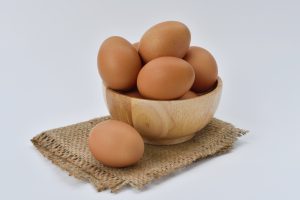 It’s no secret, prices at the grocery are rising, so finding ways to save money without compromising quality can be important. You don’t have to be on a limited budget to appreciate that. Some people are opting for meatless Monday’s and while that normally means beans or plant based protein sources, it can also mean choosing an egg as a source of protein. There’s a lot of protein in an egg, and unlike many plant proteins, it’s a complete protein.
It’s no secret, prices at the grocery are rising, so finding ways to save money without compromising quality can be important. You don’t have to be on a limited budget to appreciate that. Some people are opting for meatless Monday’s and while that normally means beans or plant based protein sources, it can also mean choosing an egg as a source of protein. There’s a lot of protein in an egg, and unlike many plant proteins, it’s a complete protein.
How much protein do you need every day and how do eggs fill that requirement.
Everything is based on size, including the number of grams of protein needed and the amount an egg contains. The average person requires about 0.36 grams of protein per pound. That will vary based on activity level, age and other factors, but for a person weighing 150 pounds who is sedentary, that means he or she needs approximately 54 grams. How much protein is in an egg? That too depends on the size. Small eggs have about 4.79 grams, while large eggs have 6.3 grams and jumbo eggs have 7.94 grams. Two jumbo eggs could offer about a third of the protein necessary for a 150 pound sedentary person.
Are you only eating egg whites?
Some people skip the yolks and consume only the whites, since most of the fat is in the yolk. However, so do most of the nutrients and about half the grams of protein. A large egg has approximately 6.3 grams of protein with 3.6 of it coming from the white and 2.7 coming from the yolk, so the whites have just a small amount more protein.
Eggs offer other nutrients besides protein.
This food was created to be nutritious and provide all the nutrients necessary for growth. A large egg contains approximately 71 calories but is loaded with nutrition. It has choline that’s necessary for metabolism and is a brain building nutrient, folate, iron, vitamins A, B12, D, E, lutein, selenium, zeaxanthin and of course, protein.
- Eating eggs can reduce the risk of cardiovascular disease and stroke. It’s also beneficial for anyone who is trying to lose weight, which lowers the risk of several serious conditions, including diabetes.
- Because eggs have healthy fat and protein, they can leave you feeling fuller longer. Starting your day with eggs can help you overcome the mid-morning munchies that take you down a path toward donuts and sweet treats.
- Other foods that are good sources of protein include kidney beans, black beans, chickpeas and lentils. Make a kidney bean salad and add hard boiled eggs to increase the protein availability.
- Even though eggs are high in cholesterol, it doesn’t mean it will raise the cholesterol in the blood. In fact, if you’re eating foods high in cholesterol, your liver makes less cholesterol to keep the amount level.
For more information, contact us today at LIV Fitness!
